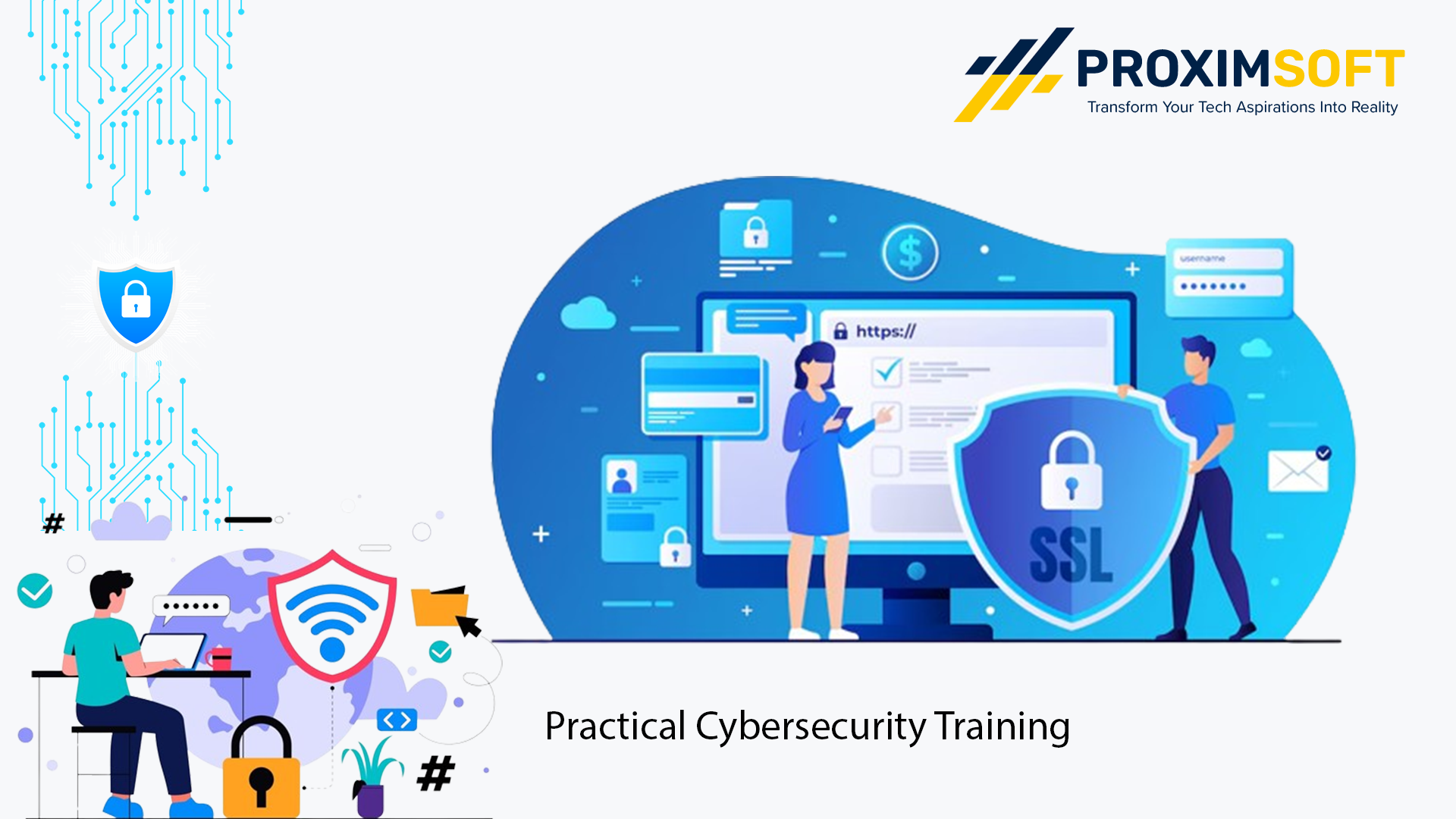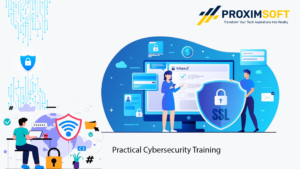Categories Networking
Practical Cybersecurity Training

Welcome to Proximsoft’s premier Cybersecurity Training – your key to understanding the essentials of cybersecurity. This comprehensive course, skilfully crafted by experienced industry professionals, provides a thorough examination of the technologies, methodologies, and protocols at the core of cybersecurity. Our curriculum is carefully designed to provide you with crucial theoretical insights and practical skills, ensuring your preparedness to strengthen networks, devices, programs, and data against potential threats.
Why Learn Cybersecurity?
- With the rise of digital assets, including cryptocurrencies, it’s crucial to learn cybersecurity to protect these assets from cyber threats and hacking attempts.
- For businesses and professionals, cybersecurity is essential to protect sensitive corporate data, trade secrets, and proprietary information from cyberattacks and industrial espionage.
- Cybersecurity expertise is in high demand, providing a vital edge in today’s tech-centric landscape.
- Our hands-on approach integrates theoretical concepts with practical application, preparing you for real-world cybersecurity challenges.
- Gain proficiency in essential cybersecurity tools and techniques, enhancing your ability to secure diverse digital environments.
| Mode of Training | Online live Interactive sessions |
| Duration of the Training | 6 weeks |
| Training duration per day | 60 – 90 min session |
| Software Access | Software will be installed/server access will be provided, whichever is possible |
| Training Materials | Soft copy of the material will be provided during the training |
| Training fee | Depends on the Requirement |
| Resume Preparation | Yes, at the end of the course based on the JD |
| Interview Preparation | Yes, by sharing some FAQ’s |
| Mock calls | Yes, 2 Technical Mock calls |
| Internship Project | Yes |
| Certification | Yes, at the end of the training |
| JOB Assistance | Yes |
| JOB Support | Yes |
| Weekdays | 6AM -2 PM EST & 6-11:30 PM EST (student can pick any 1 hr) |
| Weekends | 8 AM – 12 PM EST (student can pick any 2 hrs) |
What I will learn?
- Introduction to Cybersecurity Fundamentals
- Core Principles of the CIA Triad (Confidentiality, Integrity, Availability)
- Security Architecture and Governance
- Auditing Techniques for Assessing Security Measures
- Ethical Hacking and Penetration Testing
- Cryptography Essentials: Symmetric and Asymmetric Techniques, Hash Functions, Digital Signatures, PKI
- Understanding Computer Networks & Security: Architecture, OSI Model, TCP/IP, Network Scanning, Enumeration, Common Threats
- Application and Web Security: Server Architecture, Attacks, Countermeasures, Patch Management
- Identity and Access Management (IdAM): Authentication, Authorization, Access Administration, Password Protection, Identity Theft
- Vulnerability Analysis & System Hacking: Assessment Lifecycle, Tools, Scoring Systems, Reports, Password Cracking, Privilege Escalation
- Sniffing and SQL Injection: Malware, Propagation, Types, Sniffing Concepts, Attacks, SQL Injection Techniques
- DoS and Session Hijacking: Attack Types, Detection Techniques, Session Hijacking, Intrusion Detection Systems (IDS), Firewalls, Honeypots
Course Content
Module 1: Introduction to Cyber security
- Need of Cybersecurity
- CIA Triad
- Security Architecture
- Security Governance
- Security Auditing
- Regulations & Frameworks
- Ethical Hacking
- Types of Hackers
- Phases of Ethical Hacking
- Penetration Testing
- Types of Penetration Testing
- Footprinting
- Objectives of Footprinting
- Types of Footprinting
- Footprinting Techniques
Module 2 : Cryptography
- Types of cryptography
- Symmetric cryptography
- Asymmetric cryptography
- Hash functions
- Digital signatures
- Public Key In
- Attacks on cryptosystems
Module 3 : Computer Networks & Security
- Introduction to Computer Network
- Computer Networks – Architecture
- Layered architecture
- Open Systems Interconnect (OSI) Model
- Transmission Control Protocol/Internet Protocol (TCP/IP)
- Network Scanning
- Enumeration
- Common Network Threats/Attacks
Module 4 : Application and Web Security
- Web server architecture
- Web server attacks
- Countermeasures and patch management
- Web application architecture
- Web application attacks
Module 5 : IdAM (Identity and Access Management)
- Authentication and authorization
- Authentication and authorization principles
- Regulation of access
- Access administration
- IdAM
- Password protection
- Identity theft
Module 6 : Vulnerability Analysis System Hacking
- Vulnerability Analysis
- Types of Vulnerability Analysis
- Vulnerability Assessment Lifecycle
- Vulnerability Assessment Tools
- Vulnerability Scoring Systems
- Vulnerability Assessments Report
- System Hacking
- Password Cracking
- Privilege escalation
- Executing Applications
- Hiding Files
- Clearing Logs
Module 7 : Sniffing and SQL Injection
- Malware and its propagation ways
- Malware components
- Types of malware
- Concept of sniffing
- Types of sniffing
- Types of sniffing attacks
- SQL injection
- Types of SQL injection
- SQL injection Methodologies
Module 8 : DoS and Session Hijacking
- DoS attack
- DDoS attack
- Common symptoms of DoS/DDoS attack
- Categories of DoS/DDoS Attack Vectors
- DoS/DDoS detection techniques
- Session hijacking
- Applicationlevel session hijacking
- Network level session hijacking
- Intrusion Detection System (IDS)
- Types of Intrusion Detection Systems
- Introduction to Firewalls
- Types of Firewalls
- Introduction to Honeypots
- Evading IDS
Course level:All Levels
Course Duration: 30h
Requirements
- Basic programming knowledge is beneficial.
- Familiarity with variables, scope, functions, and flow control is advantageous.
- Object-oriented programming concepts are preferred but not mandatory.
Talk to Our Career Advisor
FAQ'S
Cybersecurity training equips individuals with skills in high demand, providing a competitive edge in the job market and opening doors to various cybersecurity roles.
While desirable, prior programming experience is not mandatory. The course caters to individuals with varying levels of technical backgrounds.
Absolutely! The course emphasizes hands-on experience, allowing participants to apply cybersecurity concepts through practical exercises in real-world scenarios.
Job positions include Information Security Analyst, Network Security Engineer, Security Consultant, and more, offering diverse career paths in the cybersecurity domain.




